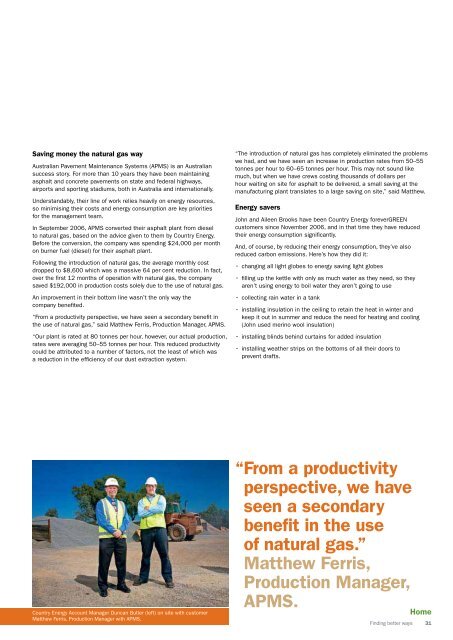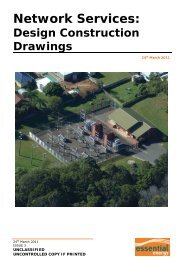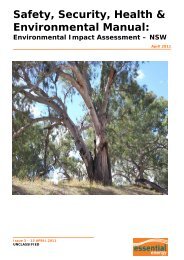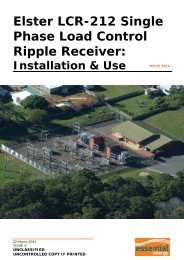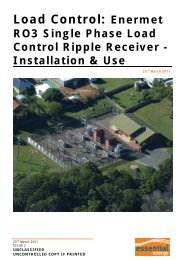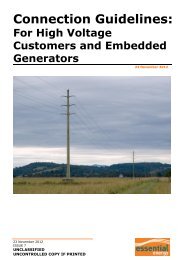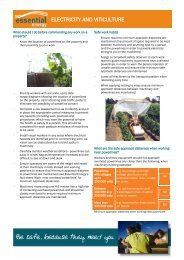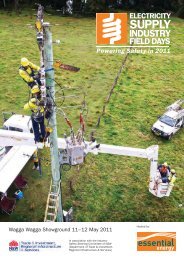Operational Reporting - Essential Energy
Operational Reporting - Essential Energy
Operational Reporting - Essential Energy
Create successful ePaper yourself
Turn your PDF publications into a flip-book with our unique Google optimized e-Paper software.
Saving money the natural gas way<br />
Australian Pavement Maintenance Systems (APMS) is an Australian<br />
success story. For more than 10 years they have been maintaining<br />
asphalt and concrete pavements on state and federal highways,<br />
airports and sporting stadiums, both in Australia and internationally.<br />
Understandably, their line of work relies heavily on energy resources,<br />
so minimising their costs and energy consumption are key priorities<br />
for the management team.<br />
In September 2006, APMS converted their asphalt plant from diesel<br />
to natural gas, based on the advice given to them by Country <strong>Energy</strong>.<br />
Before the conversion, the company was spending $24,000 per month<br />
on burner fuel (diesel) for their asphalt plant.<br />
Following the introduction of natural gas, the average monthly cost<br />
dropped to $8,600 which was a massive 64 per cent reduction. In fact,<br />
over the first 12 months of operation with natural gas, the company<br />
saved $192,000 in production costs solely due to the use of natural gas.<br />
An improvement in their bottom line wasn’t the only way the<br />
company benefited.<br />
“From a productivity perspective, we have seen a secondary benefit in<br />
the use of natural gas,” said Matthew Ferris, Production Manager, APMS.<br />
“Our plant is rated at 80 tonnes per hour, however, our actual production,<br />
rates were averaging 50–55 tonnes per hour. This reduced productivity<br />
could be attributed to a number of factors, not the least of which was<br />
a reduction in the efficiency of our dust extraction system.<br />
“The introduction of natural gas has completely eliminated the problems<br />
we had, and we have seen an increase in production rates from 50–55<br />
tonnes per hour to 60–65 tonnes per hour. This may not sound like<br />
much, but when we have crews costing thousands of dollars per<br />
hour waiting on site for asphalt to be delivered, a small saving at the<br />
manufacturing plant translates to a large saving on site,” said Matthew.<br />
<strong>Energy</strong> savers<br />
John and Aileen Brooks have been Country <strong>Energy</strong> foreverGREEN<br />
customers since November 2006, and in that time they have reduced<br />
their energy consumption significantly.<br />
And, of course, by reducing their energy consumption, they’ve also<br />
reduced carbon emissions. Here’s how they did it:<br />
<br />
<br />
aren’t using energy to boil water they aren’t going to use<br />
<br />
<br />
keep it out in summer and reduce the need for heating and cooling<br />
(John used merino wool insulation)<br />
<br />
<br />
prevent drafts.<br />
Country <strong>Energy</strong> Account Manager Duncan Butler (left) on site with customer<br />
Matthew Ferris, Production Manager with APMS.<br />
“From a productivity<br />
perspective, we have<br />
seen a secondary<br />
benefit in the use<br />
of natural gas.”<br />
Matthew Ferris,<br />
Production Manager,<br />
APMS.<br />
Home<br />
Finding better ways 31


